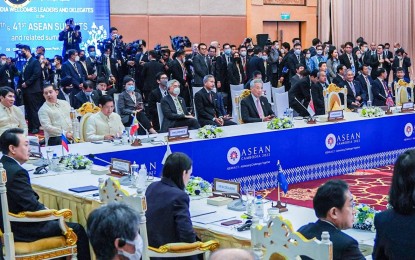
FINDING RESOLUTIONS. President Ferdinand R. Marcos Jr. on Sunday (Nov. 13, 2022) reminded contracting parties of the Treaty of Amity and Cooperation in Southeast Asia (TAC) to do their part in finding resolutions to the South China Sea (SCS) dispute without resorting to conflict during his intervention at the 17th East Asia Summit in Phnom Penh, Cambodia. Marcos said they must be guided by the universal principles of "peaceful coexistence" and "friendly cooperation." (Photo courtesy of the Office of the President)
MANILA – President Ferdinand R. Marcos Jr. on Sunday reminded contracting parties of the Treaty of Amity and Cooperation in Southeast Asia (TAC) to do their part in finding resolutions to the South China Sea (SCS) dispute without resorting to conflict.
During his intervention at the 17th East Asia Summit (EAS) in Phnom Penh, Cambodia, Marcos renewed his pitch to maintain peace and stability in the highly-contested sea.
“We must ensure that the South China Sea remains a sea of peace, a sea of security and stability, and of prosperity. With the UNCLOS (United Nations Convention on the Law of Sea) and international law as our basis, the South China Sea will be a nexus of vibrant economic engagements and interactions, not an epicenter of armed conflict or geopolitical maneuverings,” Marcos said.
He said TAC contracting parties must be guided by the universal principles of "peaceful coexistence" and "friendly cooperation."
“As high contracting parties to the Treaty, we have a moral and legal obligation to work towards finding resolutions and not resort to inciting conflicts,” he added.
The TAC, a legally-binding code for inter-state relations in the region and beyond, was established in 1976 and embodies universal principles of peaceful coexistence and friendly cooperation among states in Southeast Asia.
The Treaty has been amended three times, in 1987, 1998, and 2010, to allow for accession by states outside Southeast Asia as well as for regional organizations whose members are sovereign states, among others.
Marcos said the Philippines considers maritime cooperation as a “key priority” in bilateral and multilateral cooperation and engagements, specifically in the SCS.
‘Partnerships make us strong’
Meanwhile, Marcos enjoined fellow heads of states to prioritize cooperation on various areas to address mutual issues and concerns.
“...Our people look to their leaders, to us, to correctly navigate the uncertain waters of this new world. Our partnerships will make us strong. Our partnerships will give us wisdom,” he said.
He urged them to continue engaging all stakeholders to address challenges in Myanmar and assisting the dialogue and engagements between all concerned parties toward lasting peace and stability in a denuclearized Korean Peninsula.
Marcos said “all possible efforts” must be exerted to bring peace between Russia and Ukraine and move the confrontation there into a diplomatic feat.
He also underscored the importance of improving existing strategies towards holistic, green, and sustainable development to ensure environmentally-sound economic progress.
“It has become glaringly clear that there is a dire need to strengthen food security towards self-sufficiency in our region to increase adaptability and resilience in the face of threats to the global supply chain,” he said.
Marcos urged them to “act decisively” and “immediately” on climate change for the benefit of present and future generations.
“We, therefore, call on our Partners in EAS to continue supporting the ASEAN Centre for Biodiversity in its work and efforts towards biodiversity management directed towards climate action,” he added.
Marcos vowed continuing support for EAS initiatives, especially on promoting women’s economic empowerment, strengthening energy security, and promoting volunteerism for sustainable development.
He also thanked the Cambodian government and its Prime Minister Hun Sen for their successful chairmanship of ASEAN and looked forward to the turn of Indonesia as incoming ASEAN chair. (PNA)
